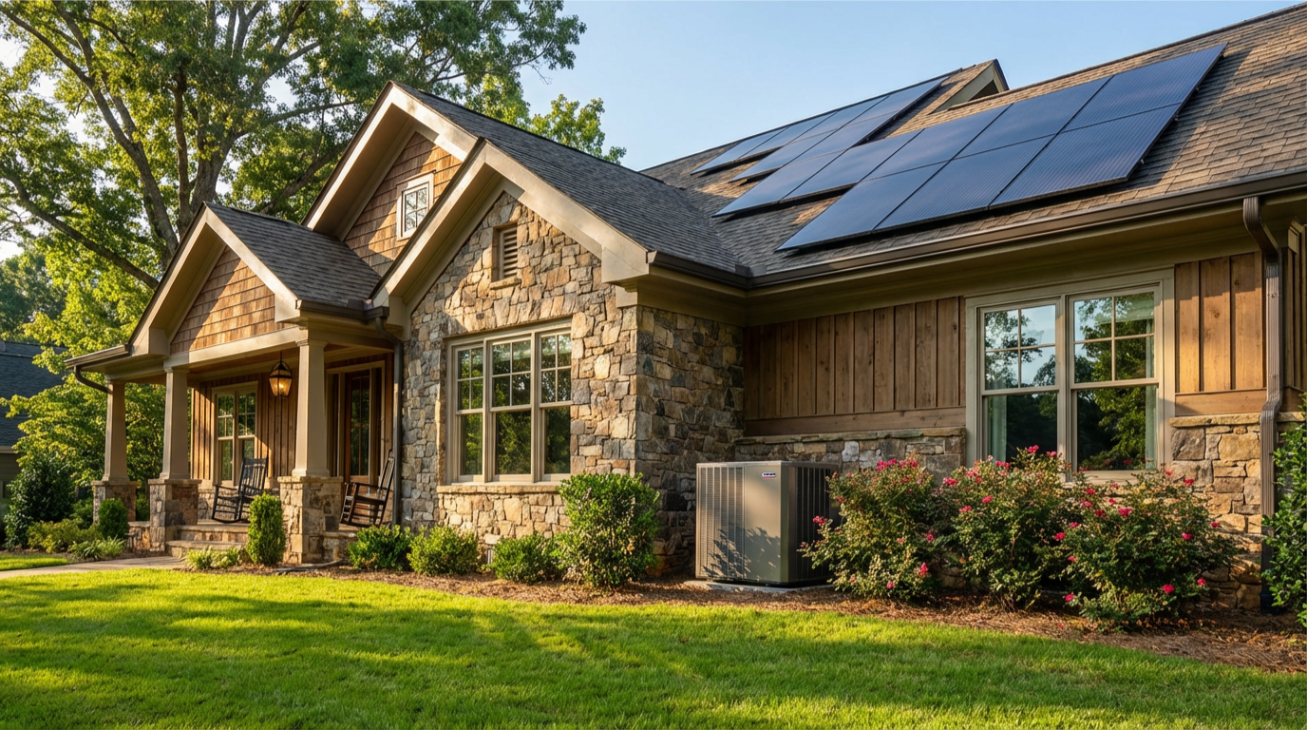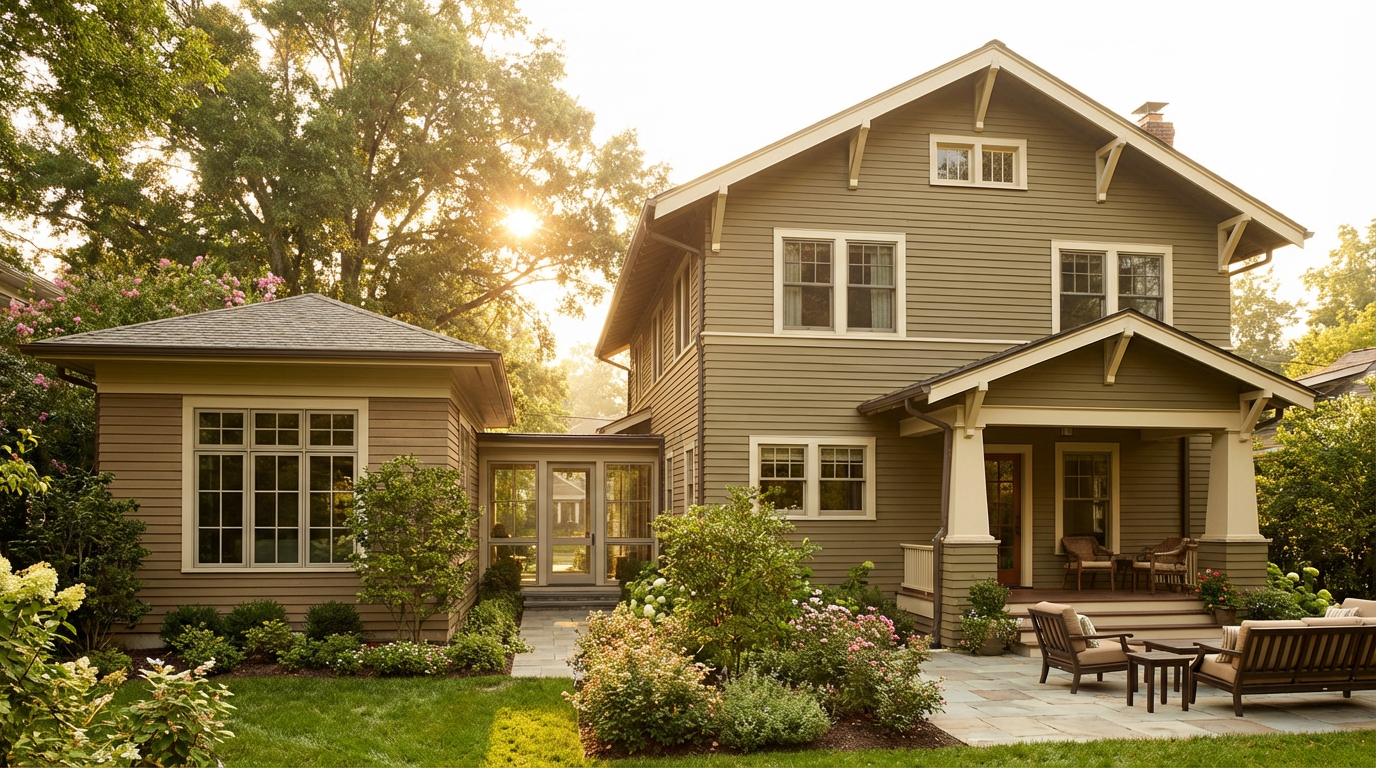Planning a renovation in North Atlanta? You’ve got plenty of financing options, but the rates and requirements change fast. Right now, renovation financing rates run anywhere from 6.5% to 14.85% APR, depending on what type of loan you choose and your credit profile.
The good news? There have been some real improvements lately. FHA 203(k) loans just bumped their limits from $35,000 to $75,000 for smaller projects, and they’re giving you more time to finish the work. Plus, Georgia’s economy is strong – we’re looking at over 56,000 new jobs this year, which means lenders are feeling pretty good about making loans.
This guide covers your financing options if you live in Alpharetta, Milton, Dunwoody, Johns Creek, Sandy Springs, Roswell, Woodstock, or anywhere else in North Atlanta Metro.
Home Equity Lines of Credit (HELOCs) are the most popular choice
HELOCs are what most people use when they want to finance kitchen remodeling, bathroom renovations, basement finishing, and home additions. Rates right now are running 7.00% to 14.85% APR, and most are tied to the Prime Rate.
Georgia United Credit Union has the best rates we’ve seen – as low as 7.00% APR with their Combo HELOC. Here’s what’s cool about theirs: you can lock portions of your balance into fixed rates for up to 10 years. And they’re fast – 10 days from application to closing. Georgia’s Own Credit Union is pretty competitive too at 7.25% APR, and they don’t charge application, origination, or annual fees.
If you want to go with a big bank, Bank of America will cover your closing costs up to $1 million and gives you rate discounts (0.25% for autopay, up to 1.50% for bigger withdrawals). Truist Bank offers new customers a promotional rate of 5.99% APR for the first nine months, then it adjusts to 7.50%-14.85%.
Here’s something to keep in mind – Georgia charges a $3.00 per $1,000 HELOC tax. Some lenders like PNC Bank will pay this upfront and set up a payment plan, but others make you handle it yourself. Factor this in along with closing costs of $200-$4,000.
You’ll need a credit score of 680+ and a combined loan-to-value ratio under 85% for the best deals. Most lenders want you to have at least 15-20% equity in your home, though Navy Federal offers up to 95% CLTV if you’re military.
Government renovation loans got a lot better recently
The FHA 203(k) program just got a major upgrade in November 2024, making it way easier for people planning kitchen remodeling, bathroom renovations, basement finishing, or home addition projects. The Limited 203(k) max went from $35,000 to $75,000, and you now get nine months instead of six to finish Limited projects (12 months for Standard loans).
Georgia FHA loan limits go up to $688,850 in the expensive counties like Fulton, Gwinnett, Cobb, Cherokee, and DeKalb – which covers most of North Atlanta Metro. Other counties max out at $524,225, but that’s still plenty for most renovation projects.
You can get these loans through Wells Fargo (they have dedicated renovation loan officers) and Rocket Mortgage (they close 15 days faster than average). CrossCountry Mortgage averages 21-day closings and might give you up to $6,500 in down payment help.
Georgia has over 60 HUD-approved 203(k) consultants, with 11 just in Atlanta. These consultants help oversee your project and manage the money draws. The recent updates made their fees part of the loan, which is nice. Companies like Metro Atlanta 203k Contractors (770-549-5081) specialize in working with these loan programs.
USDA Rural Development programs cover 120 of Georgia’s 159 counties. If you’re in an eligible area, you can get Section 502 loans with 100% financing and Section 504 repair programs that provide up to $40,000 in loans plus $10,000 grants for seniors. The interest rates? 1% fixed – way below market rates.
Conventional renovation loans are for bigger projects
Fannie Mae HomeStyle and Freddie Mac CHOICERenovation loans are the premium option. You can get up to 97% loan-to-value ratios on primary residences, and they’ll base the loan on what your home will be worth after renovations instead of what it’s worth now.
Current rates run from 7.0% to 8.5% APR – usually about 0.5-1.0% higher than regular mortgage rates. These loans can handle bigger projects with renovation costs up to 75% of the completed home value. Think complete kitchen remodeling, luxury bathroom renovations, and major home additions.
Wells Fargo, Guaranteed Rate, and Alpine Mortgage are your best bets in Georgia. Alpine Mortgage focuses specifically on Georgia and has dedicated renovation loan specialists.
The escrow and draw process is what makes these different from cash-out refinancing. Money gets released as you hit completion milestones. CHOICERenovation even lets you get 100% of materials costs upfront for home improvement store purchases. It provides oversight but means you need to coordinate carefully with your contractor.
You’ve got 15 months to finish most renovation loans. Some lenders offer CHOICEReno eXPress for smaller projects that need to be done in 180 days.
Personal loans and alternative financing work for smaller projects
Personal loan rates for home improvement run from 6.49% to 35.99% APR. If you’ve got excellent credit (720+ FICO), you can get the lowest rates. LightStream (part of Truist) starts at 6.49% APR and can fund the same day if you’re approved by 2:30 PM ET.
Georgia credit unions cap rates at 18% APR max by federal law. Delta Community Credit Union is Georgia’s biggest with 500,000+ members. They offer home improvement loans starting at 5.50% APR for kitchen remodeling projects, bathroom renovations, and basement finishing work. Credit Union of Georgia has variable rates starting at 4.00% with terms up to 180 months.
Contractor financing programs through companies like Hearth Financing and Regions let you get financing at the point of sale. They’ll work with FICO scores as low as 550 and offer promotional 0% interest options, but rates jump after the promotional periods end.
Buy-now-pay-later options like Affirm provide 0%-36% APR for specific purchases. The Pay-in-4 options give you 0% interest for smaller projects. Synchrony Financial works with most home improvement stores, but you’re limited to specific purchases rather than overall renovations.
Cash-out refinancing isn’t as attractive right now
Current cash-out refinance rates of 6.70%-6.88% APR for 30-year fixed loans are pretty high compared to what many homeowners are already paying. Unless you can eliminate PMI or consolidate higher-rate debt, cash-out refinancing might not make sense.
Georgia’s intangible tax costs $1.50 per $500 of loan amount. On a $350,000 loan, that’s $1,050 just in tax, plus total closing costs of 2%-5% of the loan amount. Some lenders offer reduced calculations for existing customers.
The 80% max loan-to-value ratio means you need substantial equity, unlike renovation loans that can use future home values. But cash-out refinancing gives you complete flexibility in how you use the money.
Learn more about soft vs hard costs
Local and state programs can save you money
Georgia Power’s Home Energy Improvement Program gives you up to $1,250 in rebates for energy-efficient improvements. You’ve got 60 days after completion to apply. They cover home energy assessments (up to $150 rebate), water heater replacements (up to $1,000), and smart thermostats (up to $200).
Federal Home Energy Rebates launching in 2025 will provide Georgia homeowners up to $14,000 in rebates through two programs. The Home Electrification and Appliance Rebates program offers up to $8,000 for heat pumps and $1,750 for heat pump water heaters. The Home Efficiency Rebates program provides $2,000-$4,000 based on your energy savings.
Georgia Dream Homeownership Program provides down payment assistance up to $10,000 (up to $12,500 for public protectors, educators, healthcare providers, and military) that you can combine with FHA 203(k) renovation loans.
Historic preservation programs offer big benefits if you qualify. The Georgia Trust for Historic Preservation provides 1:1 matching grants up to $10,000 through their 1772 Foundation. Federal Historic Preservation Tax Credits offer 20% credits for income-producing properties and 10% for pre-1936 buildings used for business.
Credit unions offer member-focused alternatives
Georgia’s credit union network often beats traditional banks on fees and flexibility. Delta Community Credit Union serves 500,000+ members across 32+ branches and offers renovation lending with interest-only payment options during HELOC draw periods.
MyGeorgia Credit Union serves Northeast Georgia’s 12-county region with HELOCs up to 80% of appraised value and competitive second mortgage options. They know the local market and provide personalized service.
Navy Federal Credit Union gives military members exceptional terms – 95% combined loan-to-value ratios and $500,000 maximum credit limits with no closing costs on home equity products. They process in 30-40 days while maintaining credit union service standards.
Credit union membership requirements vary. Some serve specific areas, employers, or military affiliations. Federal credit union rate caps at 18% APR max protect you, especially if you have fair credit.
Market conditions support renovation activity
Georgia’s housing market is stable. Atlanta Metro median home prices are at $415,000 (flat year-over-year) while North Atlanta Metro hit $839,000 (up 25.7% annually). The 44% increase in housing inventory means more opportunities for fixer-upper purchases.
Fed policy suggests potential rate improvements in the second half of 2025. Mortgage industry forecasts predict 30-year fixed rates reaching 6.3% by year-end. This could benefit renovation loan rates, which typically run 0.5-1.0% above standard mortgage rates.
Georgia’s adding 56,700 new jobs in 2025, including 14,500 high-paying positions. Tech companies expanding their Atlanta presence contribute to the high-income demographic driving luxury kitchen remodeling, spa-like bathroom renovations, custom home builds, and sophisticated basement finishing projects in North Atlanta suburbs.
What you need to qualify and some strategy tips
Credit score requirements are generally 620+ FICO for government programs and 680+ for the best conventional loan terms. Borrowers with 740+ scores get the best rates across all categories. Those with 580-679 scores might qualify for specialized programs with higher rates.
Debt-to-income ratios typically cap at 43-50% depending on the program. Government loans often provide more flexibility than conventional products. Income documentation includes two years of tax returns, recent pay stubs, and employment verification. Self-employed borrowers need additional business documentation.
Loan amounts and terms vary by product type and project scope. HELOCs typically offer $10,000-$1,000,000 credit lines with 10-year draw periods and 20-year repayment terms – good for everything from modest bathroom remodeling to extensive kitchen renovations and custom home additions. Personal loans range from $1,000-$100,000 with 1-12 year terms. Renovation mortgages can finance projects up to 75% of completed home values.
Georgia homestead exemptions provide $2,000 minimum assessed value reductions statewide, with better local exemptions in metro counties. Fulton County offers additional senior exemptions and disabled veteran exemptions up to $121,812 (2025 amount). The new “floating exemption” caps annual taxable value increases unless local governments opt out by March 1, 2025.
Timeline and process tips
Application timelines vary dramatically. Personal loans often provide same-day funding, while HELOCs typically take 30-45 days and renovation mortgages need 45-60 days for initial closing plus 9-15 months for construction completion.
Project planning should start with energy efficiency assessments to maximize rebate opportunities, then contractor interviews. Whether you’re planning kitchen remodeling, bathroom renovations, basement finishing, or custom home additions, licensed contractor requirements for most loan programs mean you need to vet qualified professionals with proper insurance and bonding early.
Seasonal considerations affect contractor availability and material costs. Spring and summer are peak for outdoor projects and home additions. Georgia’s mild climate lets you do interior projects like kitchen remodeling, bathroom renovations, and basement finishing year-round, giving you scheduling flexibility and potential cost advantages in the off-season.
Bottom line
Georgia homeowners in North Atlanta Metro have plenty of renovation financing options, from competitive credit union products to specialized government programs. Current market conditions favor borrowers with strong credit and substantial home equity, while recent program improvements help first-time buyers and moderate-income households.
The combination of stable home values, strong regional economics, and program improvements creates a good environment for renovation projects. You should compare multiple financing options, consider timing around potential rate improvements, and use available rebate and assistance programs to maximize value and minimize costs.
Planning that incorporates Georgia’s homestead exemptions, energy efficiency rebates, and specialized loan programs can make your project more feasible and financially beneficial long-term. The key is matching your specific project requirements with the right financing products while keeping realistic timelines and contractor coordination. For homeowners ready to start their renovation journey, exploring comprehensive renovation services from experienced contractors ensures projects proceed smoothly from financing through completion.




